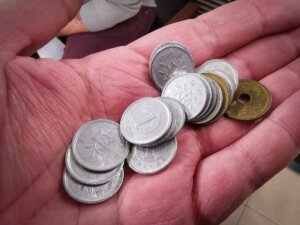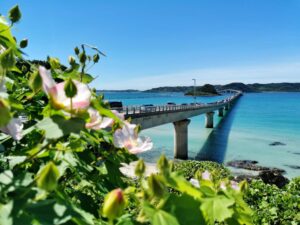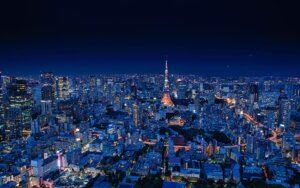Single and ready to mingle in Nihon?
While many young, single people are drawn to living in Japan, one of the primary concerns is the cost of living. Counting rent, utilities, food costs, and more, you can end up paying ¥160,000 each month. This changes based on location and lifestyle, though, with some saving more than others.
This article will give you an idea of the cost of living for singles. For an idea of what it’ll cost to get there in the first place, have a look at our previous breakdown of the cost of moving to Japan.
Food Costs
Why not start off with something a little spicy? Food costs in Japan can vary widely depending on whether you choose to dine out or cook at home.
Because of that, each person’s food bill will look different depending on how much they like to whip up their own meals.
Eating Out in Japan
Eating out at restaurants in Japan can be pricey, as with any country. Typical meals at mid-range restaurants cost around ¥2,500 to ¥3,500 ($23 to $32), but if you’re going for single meals, you’re looking at something closer to ¥1,000.
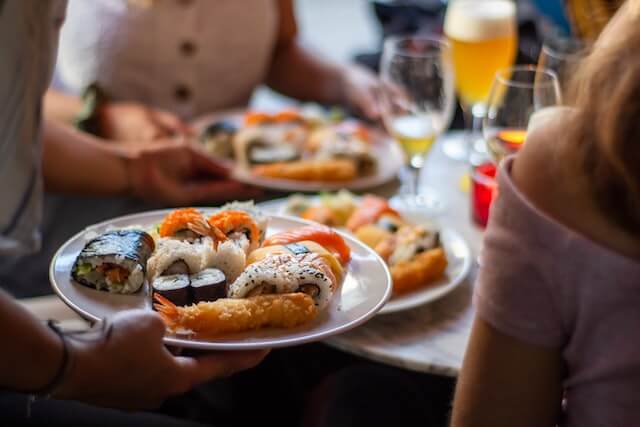
Photo by Louis Hansel
Portion sizes are also smaller here, so take that into account. With that said, you can usually get a respectable lunch for a little over ¥1,000.
Also, remember that as a country littered with Michelin Stars, Japan’s overall quality of food service is better than most places. Though that may be a matter of personal preference.
Grocery Prices in Japan
On the other hand, grocery shopping and cooking at home can be much more affordable, with the average monthly food cost for a single person being between ¥30,000 and ¥40,000 ($275 to $365).
With the extra cooking comes a larger gas or electric bill, depending on your stove type, so take that into account as well.
Rent Costs
The cost of rent in Japan is often one of the biggest expenses for a single person. Rent for a one-room apartment in a central city location like Tokyo can range from ¥60,000 to ¥100,000 ($550 to $925) per month. Those prices are significantly lower on average in Kyoto.
However, rent is lower in more rural areas, with a one-room apartment costing around ¥40,000 to ¥60,000 ($365 to $550) per month.
Your company may also subsidize your rent or even provide cheaper accommodations, so between that and choosing cheaper locales, you have some control over how much you spend here.

Photo by Arto Marttinen
Transportation Costs in Urban Areas:
Something you may not have much control over is the number of times you take a train.
In urban areas, train and other transportation fees can add up quickly, as single ride tickets on trains and buses in cities like Tokyo can be as high as ¥1,000 ($9).
However, there are also monthly pass and IC card options available, which can be a more affordable option for those who frequently use public transportation.
On top of that, most employers pay for some percentage of travel expenses. If you arrive in Japan as an English teacher with a dispatch company, this is almost guaranteed.
With that said, an estimate for the average monthly transportation cost for a single person in an urban area is around ¥20,000 ($185).
Transportation Costs in Rural Areas
If you prefer a little more green in your life, you may want to shoot for the countryside of Japan. And if you end up there, the transportation costs can be a little different.
In general, transportation costs in rural Japan are lower than in urban areas as there are fewer public transportation options available. A single ride ticket on a local bus in a rural area may cost as little as ¥200 ($2).
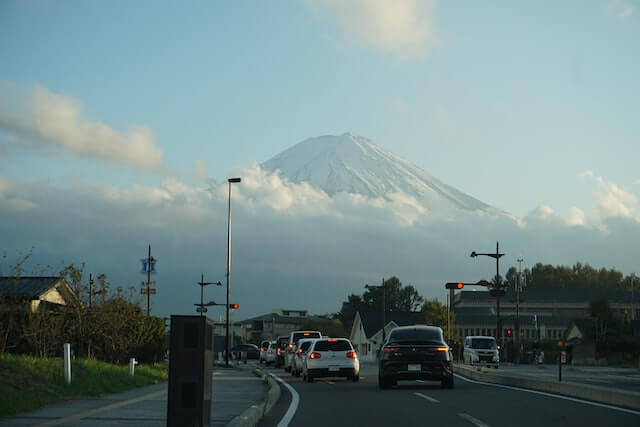
Photo by ludovico di giorgi
However, the flip side of the lack of options means that you may need to own a car in order to access some of the remote corners of your town or prefecture. Here are a few of the fees associated with owning a car in Japan:
- Bi-yearly inspections
- Yearly insurance payments
- Initial purchasing fees
- Registration fees
- Gas
When it’s all added up and averaged out, the monthly cost often comes to something close to ¥15,000. With extra train trips every weekend or so, the average monthly transportation cost for a single person in a rural area can be as high as ¥20,000.
Utility Costs
When you’re not off on adventures, you’re building up utility costs.
Each apartment is slightly different, but here are the fees you may be looking at each month:

- Gas
- Water
- Electricity
- Internet
- Cell phone
Energy costs in Japan can vary depending on the time of year (it gets steamy in the summer and frosty in the winter), but the average monthly cost for electricity and gas for a one-room apartment is around ¥10,000 ($92).
Water typically comes out to ¥3-4,000 per month and internet and cell phone plans will depend on what you’re personally looking for. Expect ¥8,000 per month to be on the cheaper side, though.
Clothing Costs
Want to lower energy costs? Pile on the clothes!
But that’s going to cost you, too.
Clothing costs in Japan can also vary widely depending on personal style and preference. A basic wardrobe of casual clothes can be purchased for around ¥20,000 to ¥30,000 ($185 to $275), while higher-end designer brands can cost significantly more.
Most people will come to Japan with the bulk of their clothing needs taken care of, so maybe you can gloss over this one.
Healthcare Costs

What you definitely shouldn’t gloss over is healthcare costs.
Hopefully you won’t need to make use of Japan’s wonderful healthcare system too often, but if you do you’ll typically pay ¥2-3,000 for a minor doctor’s visit. More if you’re getting a lot of testing done.
That’s with health insurance that you and your employer pay for together each month.
There are different health insurance plans, but most people who move to Japan from overseas will end up in the national health insurance system. Within that system, each person pays a different amount based on their salary bracket and age.
People under 40 who make 3,000,000 each year, for example, will pay ¥17,618 each month.
The Hidden Cost of Living in Japan as a Single Person – AKA Party Time
If you’re a single person coming to live in Japan, chances are you’re doing it because you want to experience life here. That usually means getting out of your apartment and splashing cash on a lot of nights out.
This is the hardest cost to measure because every person spends differently. It’s also a bit of an “overall” cost, since some of the above lifestyle factors need to be considered here, too.
For example, eating out more often and at fancier establishments will bring up the hidden cost. So will frequent shopping expeditions to Japanese designer brand stores.
With that said, it’s not at all hard to strike a balance between being a thrifty shut-in and a partier who lives paycheck to paycheck.
Try to make a budget early on and stick to it. Do that, and you’ll be fine.
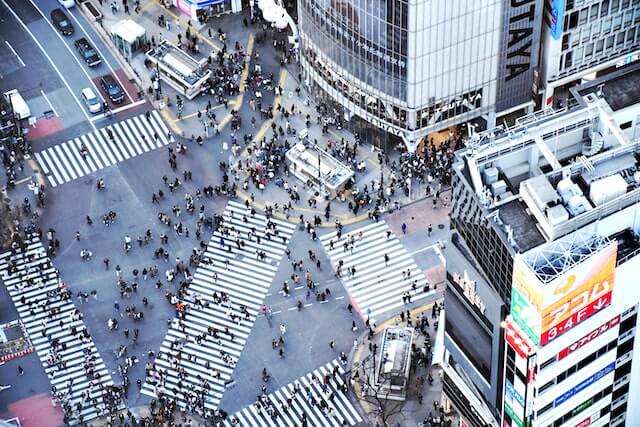
Photo by Daryan Shamkhali
How Much Does It Cost to Live in Japan Alone?
So, what does the total come to? The cost of living in Japan alone will vary depending on personal factors such as lifestyle, location, and spending habits. However, a rough estimate for the monthly cost of living in Japan for a single person is around ¥150,000 to ¥200,000 ($1,375 to $1,830).
What Salary Is Needed to Live Comfortably in Japan?
To live comfortably in Japan as a single person, it’s estimated that you’ll need a salary of around ¥6 million ($55,000) per year. Keep in mind that “comfortable,” in this case, means taking care of bills, having spending money, and being able to save a big chunk each month for the future.
Is It Cheaper to Live in Japan or America?
Japan is generally cheaper to live in than the United States, with many expenses such as healthcare and public transportation being more affordable in Japan. However, certain costs such as rent and food can be more expensive here, particularly in urban areas.
Conclusion
The cost of living in Japan for a single person can vary widely depending on personal factors such as location, lifestyle, and spending habits. While some expenses, such as healthcare and public transportation, are more affordable in Japan, others, such as rent and food, can be more expensive.
With that said, most people who come over here with an English teacher’s salary or better will be able to maintain a good standard of living.


